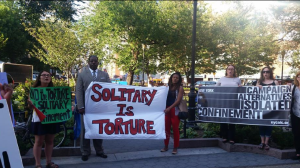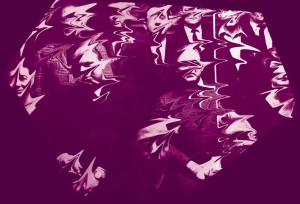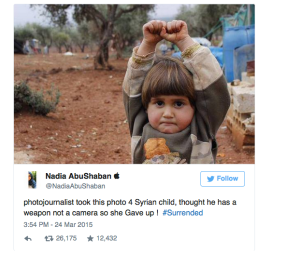
“Solitary confinement can have serious psychological, psychiatric, and sometime physiological effects on many prison inmates. A long list of possible symptoms from insomnia and confusion to hallucinations and outright insanity…The overall consistency of these findings—the same or similar conclusions reached by different researchers examining different facilities, in different parts of the world, in different decades, using different research methods—is striking.”
Brief for Professors & Practitioners of Psychology & Psychiatry
Studies and longitudinal research have show the serious psychological and physiological effects of solitary confinement – yet it is currently being imposed on over 80,000 Americans – and that number is growing.
In the U.S. both adults and children are placed in isolation. Over 62,000 minors are being held in over 2,000 juvenile facilities, and approximately 1 in 5 of use isolation. The Journal of the American Academy of Child found that incarcerated juveniles had 10 times the rate of diagnosed mental illness as children “on the outside.”
80,000+ Americans live a solitary confinement nightmare. These prisoners are physically isolated and confined to their cells for 22 to 24 hours a day, with only minimal interaction with others.
International laws and guidelines are very clear in saying that solitary confinement has no rehabilitative qualities to support it’s use and that lengthy conditions of harsh solitary confinement constitute either torture or cruel, inhuman, and degrading treatment.
Solitary confinement is justified as disciplinary punishment – both as a way to protect vulnerable prisoners and as a way for prison staff to ‘manage’ difficult individuals. It is used to isolate detainees during the pre-trial stage of investigation, as part of coercive interrogation and it is a method used to lock away prisoners especially those perceived to have mental illnesses this despite the UN Standard Minimum Rules for the Treatment of Prisoners which states that ‘Imprisonment and other measures which result in cutting off an offender from the outside world are afflictive by the very fact of taking from the person the right of self-determination by depriving him of his liberty. Therefore the prison system shall not, except as incidental to justifiable segregation or the maintenance of discipline, aggravate the suffering inherent in such a situation.’ (Rule 57)
Not only does solitary confinement violate international law and guidelines it also violates the 8th amendment of the U.S. constitution which says, “Excessive bail shall not be required, nor excessive fines imposed, nor cruel and unusual punishments inflicted.” And yet, with only a very few exceptions, U.S. federal courts have disagreed – this, despite one U.S. Senate hearing testimony on the psychological effects of solitary which described a prisoner that used thread to sew his mouth shut, another inmate who chewed off his finger and another took a television apart and ate it.
‘Isolation syndrome’ is the name used to describe the consequence of prolonged solitary confinement. Symptoms include anxiety, depression, anger, cognitive disturbances, perceptual distortions, paranoia, psychosis, self-harm and suicide. The only sporadic contact that prisoners have is with guards, despite the research that family contact is one of the most important factors in successful rehabilitation. Solitary prohibits the very thing needed for a new life – access to loved ones and support networks. And while some prisoners are able to construct meaning and occupy their time without going crazy, others are not so able, experiencing severe depression and crushing mental illness.
International observer Tessa Murphy of Amnesty International’s Campaigner on the United States has said, ““The USA’s isolation system is a shocking and outdated form of punishment which should have no place in any country purporting to respect human rights principles. The fact that anyone is able to survive the inhumanity of a system which seems specifically designed to break them is incredible.”
Lawyer Clive Stafford Smith said: “Solitary confinement is one of the techniques used to ‘break’ prisoners in Guantánamo Bay. Sadly I can testify that it has the sickening, desired impact, and has caused serious mental health problems for the people I represent. We should put these ugly human experiments behind us.
Another dimension that is very worrisome and shocking are the for-profit companies responsible for approximately 6 percent of state prisoners, 16 percent of federal prisoners, and inmates in local jails in Texas, Louisiana, and other states. This means for-profit companies decide which prisoners are kept in solitary and for how long. Private prisons have have been shown to use excessive of solitary confinement
The fact is that solitary confinement doesn’t work: One 2001 study of recidivism in Connecticut found that prisoners who had been held in solitary confinement were about 50 percent more likely to be rearrested within three years than those who had not. A study in Washington state found that inmates who had spent three months or longer in solitary were not only more likely to re-offend but were much more likely to commit a violent crime. In the report, Confronting Confinement (Commission on Safety and Abuse in America’s Prisons) they found, “the disconnect between what we know to work and the laws and policies legislatures implement is perhaps greater in this field than in any other area of social policy.”
Human contact constitutes a basic human need and as such our courts, legislators and prison officials need to recognize the serious psychological and physical pain resulting from isolation. Solitary confinement is torture and it must be stopped.
Some good news:
The movement to end juvenile solitary has gotten a boost from the Annie E. Casey Foundation, whose recommendations on juvenile justice reform have been adopted by more than 200 jurisdictions, including Baltimore, San Francisco, and Dallas County, Texas.
New York City’s Board of Correction voted to end solitary for inmates under 21 starting in January 2016.
Sept 2015: California agreed Tuesday to end its unlimited isolation of imprisoned gang leaders, restricting a practice that once kept hundreds of inmates in notorious segregation units for a decade or longer.
See links for more information. Consider joining organizations like the Campaign for Alternatives to Isolated confinement.
http://nycaic.org/
The goal of the Campaign for Alternatives to Isolated Confinement (CAIC) is sweeping reform of New York’s use of solitary confinement and other forms of extreme isolation in state prisons and local jails.
Recommended: The Friend’s Service Committee’s fact sheet : The American Friends Service Committee (AFSC) is a Quaker organization that promotes lasting peace with justice
https://www.afsc.org/resource/solitary-confinement-facts
http://www.motherjones.com/politics/2014/01/juveniles-kids-solitary-confinement-ohio-new-york
On Human Rights Day, Public Figures Call for Worldwide Ban on Solitary Confinement and Prisoner Isolation
Brief for Professors & Practitioners of Psychology & Psychiatry as Amici Curiae Support-ing Respondent at 4, Wilkinson v. Austin (Austin V, 545 U.S. 209 (2005) (No. 04-495).
Growing Up Locked Down
https://www.hrw.org/report/2012/10/10/growing-locked-down/youth-solitary-confinement-jails-and-prisons-across-united
Click to access 5-Prisons-Factsheet.pdf
The Shocking Abuse of Solitary Confinement in U.S. Prisons
http://blog.amnestyusa.org/americas/the-shocking-abuse-of-solitary-confinement-in-u-s-prisons/
Recidivism in Connecticut
Click to access 2001recidivisminconnecticut.pdf
Confronting Confinement
Click to access Confronting_Confinement.pdf










